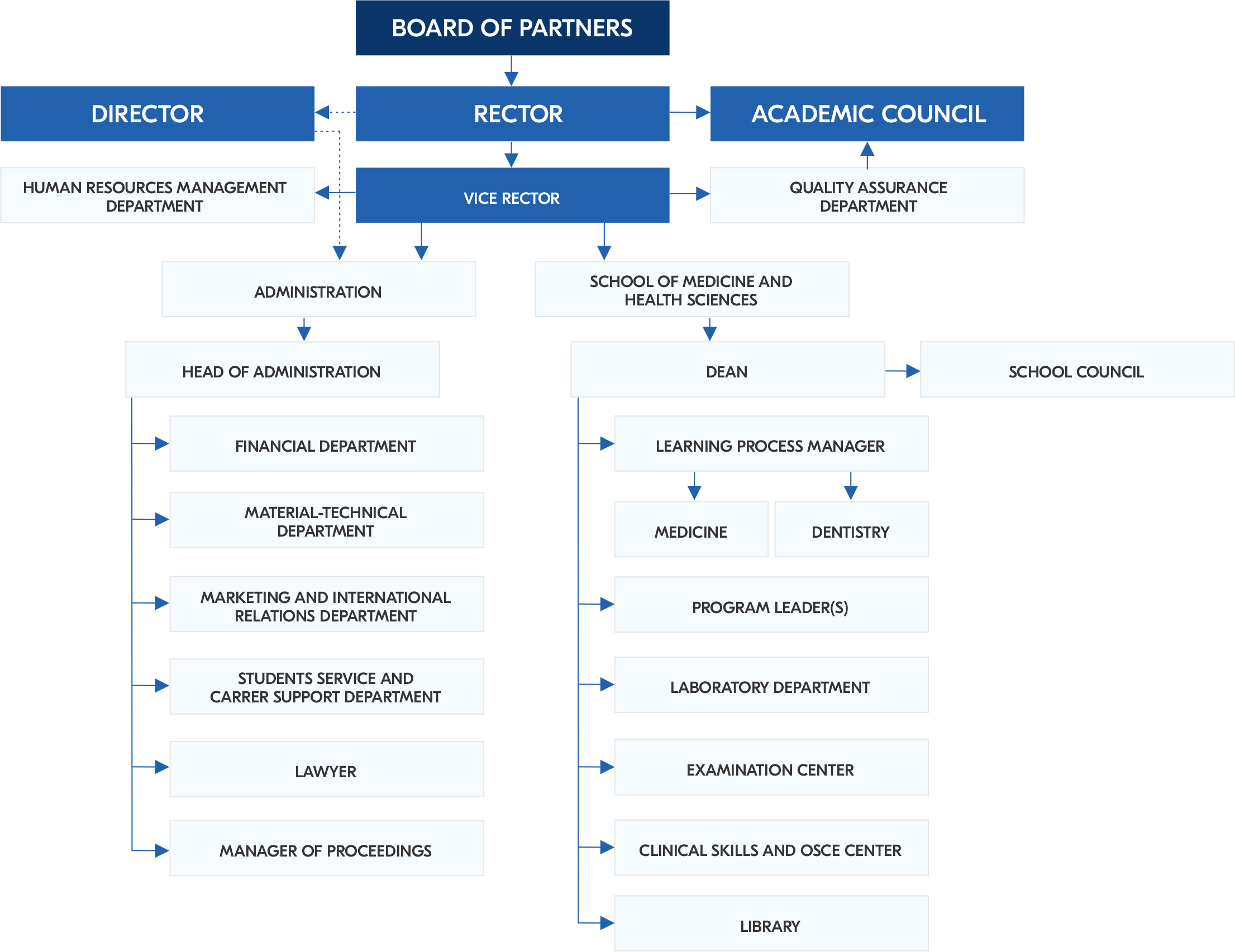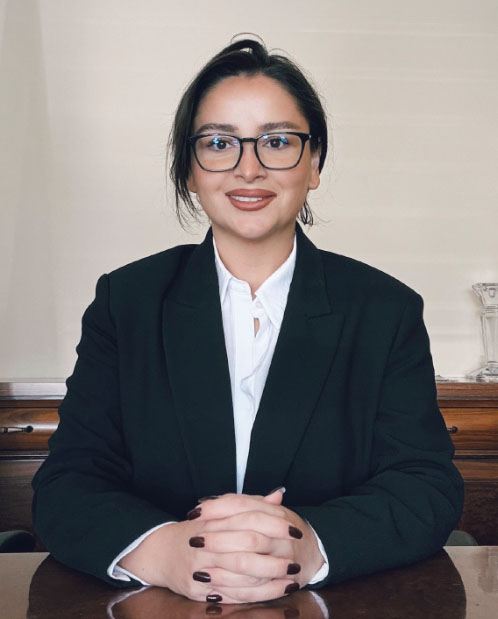The structure of the teaching university consists of the governing bodies of the university, the educational unit, the administration, the human resources management and the quality assurance services.

The governing bodies of the teaching university are:
Board of Partners
The Assembly of Partners is the highest governing body of the Teaching University, which controls the legality, expediency, efficiency and financial-economic activities of the Teaching University.
2. The Assembly of Partners:
a) Makes decisions on changes and additions to the registration data of the University and the charter, approves the new version of the charter;
b) On the basis of consultations with the Academic Council, appoints and dismisses the Rector of the Teaching University, as well as supervises its activities;
c) Is authorized to request financial reports of the relevant period from the Rector of the Teaching University at any time, to control and check the financial documents of the University and the execution of the budget;
d) Is authorized to request information from the Rector of the Teaching University at any time about the implementation of the Strategic and Action Plan for the development of the Teaching University;
e) Is authorized to suspend or/and abolish the legal acts adopted by other governing bodies or/and officials that are illegal or/and contradict the charter of the university or/and this statute or/and other internal normative acts.
Academic Council
The Academic Council is the highest representative collegial body managing the academic activities of the Teaching University.
The Academic Council consists of the Chairman of the Academic Council - Rector, the academic staff of the Teaching University, who have been awarded the status of Professor or Associate Professor, and the Chairman of the Student Self-Government.
Teaching University Professors and Assistant Professors are granted Academic Board status upon assuming a Teaching University academic position if they do not renounce their Academic Council membership.
A student member of the Academic Council is granted the status of a member of the Academic Council by the Student Self-Government upon application to the Academic Council.
The term of the status of a member of the Academic Council is determined by the term of the relevant position held at the University, and if no such term is established, the person retains the status of a member of the Academic Council until resignation, unless there are grounds for early termination.
The term of the student member status of the Academic Council is determined by the term of the position of the Chairman of the Student Self-Government, if there is no reason for early termination of the membership of the Academic Council established by this Regulation.
The Academic Council consists of the Chairman of the Academic Council - Rector, the academic staff of the Teaching University, who has been awarded the status of Professor or Associate Professor, and the Chairman of the Student Self-Government.
Teaching University Professors and Assistant Professors are granted Academic Board status upon assuming a Teaching University academic position if they do not renounce their Academic Council membership.
A student member of the Academic Council is granted the status of a member of the Academic Council by the Student Self-Government upon application to the Academic Council.
The term of the status of a member of the Academic Council is determined by the term of the relevant position held at the University, and if no such term is established, the person retains the status of a member of the Academic Council until resignation, unless there are grounds for early termination.
- Academic Council Meeting Summary - 13 February, 2025
- Academic Council Meeting Summary - 24 November, 2025
- Academic Council Meeting Summary - 27 March, 2025
Rector

Irene Imerlishvili
The authority of management and representation in the educational and scientific-research direction of the Teaching University is given to the Rector, who appoints and dismisses the position in agreement with the Academic Council and dismisses it by the meeting of partners.
The Rector, within the scope of his / her competence, directs the administrative, educational, and scientific-research activities of the Teaching University, in connection with which he/she approves the regulatory acts in relation to the issues within his / her competence. Rector:
- Without additional power of attorney, in the field of education and science, represents the teaching university in relations with third parties and concludes relevant transactions;
- Makes a decision on the creation, abolition, merger, and division of the organizational-structural unit of the teaching university and, if necessary, submits it to the director for approval;
- Within the scope of its competence, approves the regulations, job instructions, internal regulations, ethical norms, and amendments to the teaching university and organizational-structural units;
- Within its competence, controls the implementation of the charter, regulations, internal regulations, and other internal normative acts of the Teaching University;
- Chairs the Academic Council and signs, as well as, if necessary, send to the Director for additional signature the minutes and resolutions of the meeting of the Academic Council;
- submits to the Director for approval the decisions made by the Rector, the Academic Council, and/or other organizational-structural units of the University, which require the University to take and/or fulfill any financial and/or other property obligations;
- submits the strategic development and action plan for the development of the teaching university to the Academic Council for approval;
- submits reports on the work done to the meeting of partners and the Academic Council;
- In accordance with the legislation of Georgia and the internal normative acts of the Teaching University, makes a decision on granting, suspending, terminating, and restoring the student status;
- Approves and signs the documents certifying higher education (certificate, diploma, diploma attachment, etc.);
- Establishes and approves the academic calendar, which defines the beginning, end of the academic year, academic and financial registration, examination period, and other terms related to the study process;
- sets the deadlines for announcing internal mobility in the teaching university and, in agreement with the school and the quality assurance service, approves the number of students to be admitted;
- Approves the official seal, letterhead, logo, and other attributes of the Teaching University;
The Rector is accountable to the Assembly of Partners for the strategic and organizational activities of the Teaching University, and to the Academic Council for the academic, scientific, and educational activities of the University.
Vice-rector
Giorgi Tshkhvediani

Tea Mikeladze
The Rector of the Teaching University shall delegate part of his / her powers to the Vice-Rector, who shall be appointed and dismissed in consultation with the Academic Council.
The powers of the Vice-Rector include:
- Develop/develop strategic development and action plans of the Teaching University and coordinate their implementation;
- Development/development of indicators for implementation of measures defined by strategic and action plans/plans;
- Supporting the academic development of the teaching university;
The powers of the Vice-Rector include:
- Ensuring the implementation of the relevant principles of quality development in the usual academic and administrative procedures of the University;
- Leading institutional development planning, evaluation, self-assessment, and development working groups;
- Supporting the academic and administrative activities of the Teaching University;
- Promoting and coordinating the development of academic cooperation at the Teaching University;
- Representation of the teaching university with the third parties of the teaching university on the issues determined by the rector;
- Other authorities are covered by the charter of the teaching university, this statute
